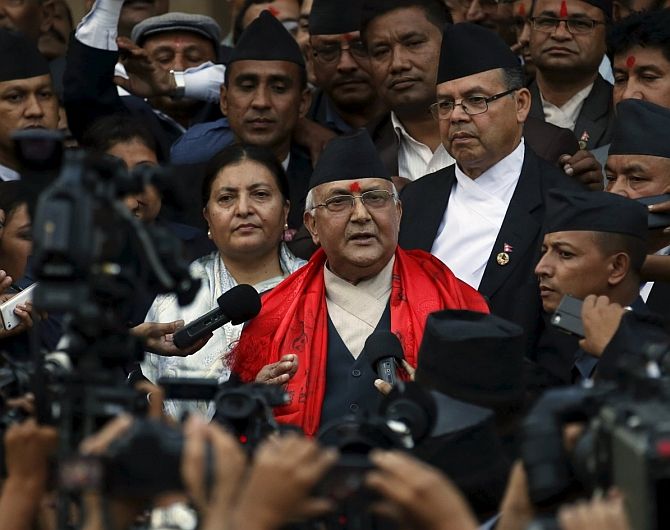 In a move that could potentially irk New Delhi, China has offered to supply liquified petroleum gas to Nepal after gifting fuel to ease the crisis in the country, hit by acute fuel shortage due to a blockade at key border trade points with India.
In a move that could potentially irk New Delhi, China has offered to supply liquified petroleum gas to Nepal after gifting fuel to ease the crisis in the country, hit by acute fuel shortage due to a blockade at key border trade points with India.
According to Nepal's Ambassador to China, Dr Mahesh Maskey, China has expressed its willingness to supply cooking gas bullets directly to Kathmandu by establishing a joint customs point at Panchkhal of Kavrepalanchowk district, situated 75 kilometres east of the capital city.
Maskey announced this on Sunday while briefing Vice President Nanda Bahadur Pun regarding the import of fuel from China to end the obstruction of fuel supply caused by blockade in the Nepal-India border, according to officials.
A bullet of cooking gas is equal to 1,250 cylinders and monthly consumption of cooking gas stands at 1.5 million cylinders in the country.
Nepalese authorities are preparing for signing a trade agreement with China to bring in more fuel.
Ninety per cent of the 1.3 million litres of fuel gifted by China to fuel-starved Nepal has already arrived Kathmandu through Kerung-Rasuwagadhi trading point, that was recently opened with the joint efforts of Nepal and China even as the entry point was severely damaged during the April 25 quake.
Petrol and diesel could be brought from Kerung-Rasuwagadhi border point while gas bullets could be brought via Tatopani border point, 110 km east of Kathmandu, Maskey said.
Meanwhile, hundreds of people queued in Kathmandu to buy firewood after the government arranged selling firewood to the city dwellers in subsidised rate of Rs 15 per kg.
One person will be provided with 100 kg of fire wood for cooking purposes, according to a government notice.
The move came as Prime Minister K P Sharma Oli asked India to end an "undeclared blockade" that has left the country desperately short of fuel and other supplies.
During a televised address to the nation on Sunday, Oli asked India to end the blockade in the border as it would invited humanitarian crisis in the country.
He said the crisis brought by the blockade was more severe than war-time situation.
Meanwhile, the cadres of the agitating Joint Madhesi Front seized 500 litres of petrol at Gaushala in Mahottarai district today and destroyed it, saying the fuel was smuggled into Nepal from India.
The Front has launched agitation in the southern Nepal districts for around three months against the new Constitution that divides the country into seven provinces, saying that they do not want to mix the hilly regions with the southern plains.
Hospitals, schools hardest hit
Many hospitals in the Nepalese capital are facing a serious medicine shortage due to the ongoing blockade, affecting the supply of fuel and essential life saving drugs.
The Paropakar Maternity and Women's Hospital in Kathmandu, the oldest maternity hospital of Nepal, has been facing severe medicine crunch since the blockade on the border started affecting the supply of essential goods, including medicines.
According to Amarnath Amatya, administrator of the hospital, surgeries have been hindered due to the medicine crunch.
The hospital has been providing medication to few expecting mothers with the limited drugs available in its store. But the stock is also likely to run short of medicines within few days, he said.
The medicines could hardly last for a week or more, he added.
The hospital has requested to the government to provide oxygen cylinders and other essential medicines.
The daily requirement of the hospital comprises of 10 cylinders of oxygen gas, one cylinder of cooking gas, 110 liters of diesel and 10 liters of petrol, according to hospital staff.
Furthermore, the ambulance services provided by the hospital have been cut down following the ongoing fuel crisis.
The 600-bed hospital, which earlier received more than 100 patients, now receives about 60-70 patients in a day.
Some 300 trucks filled with medicines have been stranded in Raxaul, India, the main trading point between the two countries, for weeks due to the blockade.
The Indian-origin Madhesi people have enforced a blockade in the southern plains of Terai demanding more representation and separation of the plains from hilly areas under the newly-enacted Constitution.
Meanwhile, only 60 per cent of the private and boarding schools in the Kathmandu Valley have opened after the Dussera and Deepawali holidays.
Although the schools were planning to reopen after the festival season, continuing fuel shortage has forced them to change their decision, authorities said.
Mukunda Sharma, principal of Little Angels School which opened on Monday after a long break, said they have very limited stock of diesel to ferry students and if the government fails to supply adequate fuel, they might have to halt classes again.






 © 2025
© 2025